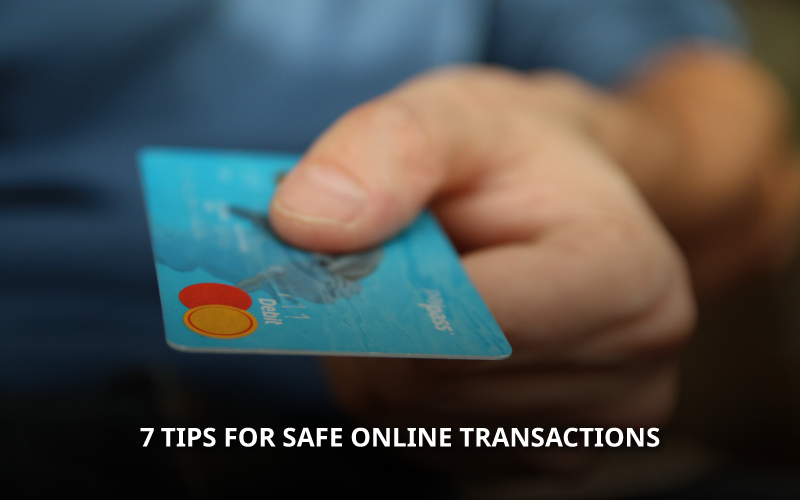Do you feel scared to share your personal banking details online? Are you not convinced of safe online transactions because of the increasing number of frauds? Online fraudsters are constantly looking for new ways to scam the public, and sometimes, even your bank may not be able to help!
So we’ve compiled 7 safety measures you can take to ensure that you avoid payment data fraud. Some of these are simple steps you can take right now, while some are more advanced and would need the help of software. Let’s dive in.
Contents
- 1 Should you be worried about online payment fraud?
- 2 7 Ways to ensure safe online transactions and protect your money
- 3 1. Install the latest security software
- 4 2. Secure your passwords
- 5 3. Use a secure WiFi connection
- 6 4. Email security
- 7 5. Buy from reputed merchants
- 8 6. Use secure eCommerce websites
- 9 7. Online shopping tips
- 10 Offer a secure eCommerce experience
Should you be worried about online payment fraud?
When making online payments on eCommerce platforms or transferring money via netbanking, should you be concerned?
The Reserve Bank of India has taken many steps over the years to make online transactions safe. These include safety standards that online merchants need to meet and various security breach protocols.
In addition to this, online payment enablers like Instamojo have the Payment Card Industry Data Security Standards (PCI-DSS), which is the highest security standard.
Statistic-wise, in 2022 Indian card and internet frauds surged to $1.55 billion in 3,596 cases, according to the Reserve Bank of India. This number was slightly less than the previous year. This means fraudsters still find ways to steal transaction data despite all the safety measures.
7 Ways to ensure safe online transactions and protect your money
If you are concerned about making payments online, here are 7 extra steps you can take to protect your money online every time you make a transaction.
1. Install the latest security software
The internet is full of malware, spam, and spyware. These software programs can damage your computer. It is necessary to keep your operating system up to date with the latest security software. Install these only from a trusted source.
Using ad-blocking software and a spyware detection program are some ways to prevent online fraud. Run virus scans regularly and keep these programs updated.
2. Secure your passwords
Use passwords that are hard to guess. Longer passwords including upper and lower case letters, numbers and, symbols are more secure. Try using different passwords for different accounts. Using the same password is risky and more prone to online data breaches.
3. Use a secure WiFi connection
Do not make a payment over public WiFi terminals. They may not be entirely secure and are more likely to have weak data protection systems.
Avoid updating passwords using public internet connections. Always use a trusted WiFi connection or your own mobile data. Using original banking apps also minimizes your risk of fraud. Make sure the app you are using is the bank’s or the payment company’s official application or website.
Related read: Top eCommerce frauds and how to prevent them
4. Email security
Stay away from emails that ask for confidential information. Phishing emails are more common than you can imagine. None of the payment companies or banks asks you for your confidential payment data. Here are some pointers on how to avoid malicious mail:
- Do not open emails from a suspicious source
- Don’t trust clickbait subject lines
- Don’t follow flashy URLs or buttons
- Create spam filters in your inbox
- Don’t open any emails asking for identification information
5. Buy from reputed merchants
Always buy from reputed merchants or marketplaces. Transactions on trusted eCommerce platforms ensure your payments are safe and your data isn’t compromised.
How do you identify a trustworthy website? Don’t just go with your gut feeling but also read up on the privacy policy to ensure your financial data isn’t being tampered with. Check confirmation emails on completing transactions.
As far as possible use only one credit card or better, a debit card for online purposes to limit exposure to fraud and thefts on your cards.
Related read: 5 Ways to identify fraud loan apps and avoid losses for small businesses
6. Use secure eCommerce websites
Make online transactions on websites that begin with “HTTPS”. Do not trust websites that begin with “https”, this means that the website isn’t using proper encryption. Avoid pop-ups that appear during your banking session. Log out immediately and do not provide any confidential information via email.
7. Online shopping tips
Always log out of your bank, credit/debit card, and merchant sites after completing your online transaction. Do not save financial passwords on your computer.
Offer a secure eCommerce experience
Are you an online seller looking to offer a secure and smooth payment experience to your customers? Get started with an online store on Instamojo in under 5 minutes to ensure the safety of your data and your online transactions. You can also use payment links and setup a secure transaction process


5 comments
Thanks for the info keep posting
Well doing ecommerce transactions always care about your security password and connection method as using unsecure connection will be more harmful to you to use as there are chance of hacking or stealing your password to avoid these always use your connection to safe mode and use updated security software’s to avoid risk of stealing password. Visit us @ https://www.denaliatm.com/
Very helpful tips, thanks for sharing.
Many buyers and consumers who do not know payment gateways will have questions about their security. In fact, payment gateways are very secure when they are properly configured and managed – for example g2a pay payment gateway
Nice post.